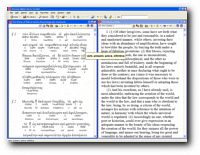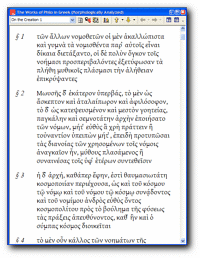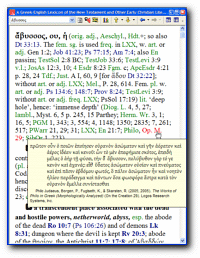 The
Works of Philo: Greek Text with Morphology
The
Works of Philo: Greek Text with Morphology
Imagine being able to ask questions of a first-century Hellenistic Jewish
philosopher, a contemporary of Jesus and Paul who worked to understand
Mosaic thought in light of Greek ideals. What kinds of questions would you
ask to better understand the theology, interpretive strategies, and
historical context of the biblical writers, who often wrestled with the same
task?
The writings of Philo Judaeus, who lived in Alexandria, Egypt, between
approximately 20 B.C. and A.D. 40, provide a fascinating glimpse into the
world of Jesus and the Apostles. In fact, PhiloТs works are a goldmine of
information on Jewish exegetical methods, the worldview of the apostles, and
theological matters of great importance for Christianity.
We are pleased to bring you the first electronic edition of the complete
works of Philo in Greek, morphologically tagged. This resource is built upon
the database compiled by the Norwegian "Philo Concordance Project," which
published the first complete,
printed concordance of Philo in 2000. The Logos Bible Software resource
includes the complete works of Philo, in Greek, drawn from the same four
text editions used to compile the concordance (Cohn & Wendland, Colson,
Petit, and Paramelle). The lemmatization and morphology are also supplied by
the Philo Concordance Project scholars.
Benefits of the Logos Bible
Software Edition
The reviewer for Review of Biblical Literature called The Philo
Index "an indispensable tool for anyone working on Philo or Judaeo-Greek
of the period." Yet it's the kind of resource that is born to be digital. In
fact, the forward to The Philo Index states, "The database contains
much information that is not easily represented in a printed edition like
this index."
The Libronix Digital Library System unlocks this data for scholars and
students all over the world, opening up avenues of research that are simply
inconceivable with a print book.
- Perform both simple and complex searches for surface forms, lemmata,
and morphology; and view the results in context or click to open the
Greek text directly to the passage.
- Lemma forms are encoded in the resource (forms match those in LSJ),
enabling instant look-up of words in whatever Greek lexicon you may own.
- Reference works that contain hot links to Philo (e.g., BDAG) jump
you directly to the paragraph of Philo that's cited and can even be set
to preview the cited section of Philo when hovering the mouse over the
reference. Read the
Logos Blog entry on this topic for more
detailed information.
- Because Libronix DLS is unicode-based, you can effortlessly copy and
paste Greek text from the application into a word processor or
presentation.
- Link the Greek edition of Philo with the English and scroll them
synchronously.
(Note: The morphological analysis contained in this edition is under
revision. Forms that are ambiguous; particularly conjunctions, particles,
pronouns and adverbs, are in the process of being revised. A rebuilt
resource with the updated form of this information will be made available at
no cost via download upon completion of the extended analysis.)
The Value of Philo's Works
for Biblical Studies
A noteworthy example of this is PhiloТs discussion of the Logos as a
Уsecond godФ (δευτερος Θεος), a figure who was
interchanged with the God of Israel in PhiloТs understanding of the Hebrew
Bible, but who was distinct from the God of Israel. PhiloТs works are
fundamental for demonstrating, in part, how first-century Jews could embrace
the idea of a divine Son or godhead.
This is one of the most well-known examples of how Philo can inform our
understanding of the NT, but careful study will show that instances abound.
In 1 Timothy 1:19, Paul says, "By rejecting this [Paul's charge], some have
made shipwreck of their faith..." Shipwreck is a vivid
metaphor that conveys a powerful sense of disastrous results, and calls to
mind the fact that Paul himself experienced shipwreck three times (2 Cor
11:25). In exploring the metaphor further, we might want to locate other
instances of the Greek lemma ναυαγέω in other
writings. A quick search of The Works of Philo: Greek Text with
Morphology for this word brings up Philo's On the Change of Names
where he writes,
Еif we have fallen in with ever so slight a breeze which bears us
towards the good fortune, immediately set all sail and became greatly
elated, and being full of great and high spirits, hurry forward with all
our speed to the indulgence of our passions, and never will check our
unbridled and immoderately excited desires until we run ashore and are
wrecked as to the whole vessel of our souls.
Philo uses the same verb (ναυαγέω) employed
by Paul, in a similar context. (Notice that the English translation doesn't
use the word "shipwreck" which is all the more reason to own the lemmatized
Greek text.) Like Paul, Philo conveys the image of a ship run aground on a
leeward shore. The subject's soul or faith is utterly destroyed as a result
of heedless and reckless adherence to the wrong course.
These are just a couple of examples of how valuable it is to have an
electronic edition of Philo in Greek, making it easy to find words, phrases,
even complex constructions that occur both in Philo and the New Testament.
Looking beyond the New Testament, Philo's works are cited dozens of times by
the Apostolic Fathers and other early Christian writers (a complete list of
these references has been compiled
here), which is another indication of how
important they are for contextualizing Christianity. In fact, some early
Christian writers attempted to claim him as a Christian. For example, the
church historian Eusebius believed Philo and Peter knew each other. In
addition to PhiloТs teachings about the Logos, his writings on concepts such
as the Holy Spirit, grace, faith, and the Уspiritual (ideal) IsraelФ seem
quite Christian.
Anchor Bible Dictionary summarizes the value of Philo's works as follows:
In modern historical research, Philo is studied as a source for Greek
philosophy, as a representative of Second Temple Judaism and as a
forerunner of early Christian thought. As for the latter, Philo has
especially been studied to throw light on the concept of Logos in the
Gospel of John, on Platonisms in the Epistle to the Hebrews, and on
exegetical techniques and forms used in the New Testament. PhiloТs
writings reflect a variety of movements within Judaism in the time of
the beginnings of Christianity, and this observation has thrown light on
some of its conflicts and debates, particularly in relation to Judaism
and the Hellenistic world.
A great deal of excellent information about Philo and the value of his
writings for modern scholarship can be found on the
Resource Pages for Philo of Alexandria and
the
Philo of Alexandria Blog (both of which are
maintained by Dr. Torrey Seland, professor in biblical studies at Volda
University College in Norway).
About the Philo Concordance Project
Contributors to the project are:
The
Philo Concordance Project website
introduces the project as follows:
The Philo Concordance Project is a Norwegian project aiming at
producing a complete Philo electronic concordance. The word indices
printed this far are printouts of a database containing all the Greek
words in the writings of Philo of Alexandria, main fragments included.
The database consists of about 437 400 tokens (text≠forms) and more than
14 000 different lemmas (the chosen entry form). A complete KWIC version
would fill more than 10 000 pages on paper. Such a large volume of
material is better suited for a publication in electronic form rather
than in book form.
Additional details about the history and status of the project are
provided on the website, as well.
Sample Screenshots from the Electronic Edition
Click a thumbnail to see the full-size version.
 |
 |
 |
| Fig. 1ЧOn the left: Works of Philo in
Greek, with three lines of information visible: Greek text,
morphology, and lemma. The Libronix DLS interlinear display feature
enables each of these lines to be shown or hidden. As the mouse
hovers over a word, a tip window pops up with the parsing
information. The Greek text has been set to scroll synchronously
with the English. |
Fig. 2ЧThe Works of Philo: Greek Text
with Morphology. The two secondary lines have been hidden, so only
the Greek is showing. Parsing tip windows and right-click lexical
look-ups are still available. |
Fig. 3ЧHover the mouse over a Philo
reference in BDAG (if you own it) and the cited passage is previewed
in a tip window. Click to open the Greek Philo text directly to the
passage cited. |
Texts Included
- On the Creation (De opificio mundi)
- Allegorical Interpretation (Legum allegoriae I, II & III)
- On Cherubim (De Cherubim)
- On the Sacrifices of Abel and Cain (De sacrificiis Abelis et Caini)
- The Worse attacks the Better (Quod deterius Potiori insidiari soleat)
- On the Posterity and Exile of Cain (De posteritate Caini)
- On the Giants (De gigantibus)
- On the Unchangeableness of God (Quod Deus sit immutabilis)
- On Husbandry (De agricultura)
- On NoahТs Work as a Planter (De plantatione)
- On Drunkenness (De ebrietate)
- On Sobriety (De Sobrietate)
- On the Confusion of Tongues (De confusione linguarum)
- On the Migration of Abraham (De migratione Abrahami)
- Who is Heir of Divine Things (Quis rerum divinarum heres sit)
- On the Preliminary Studies (De congressu eruditionis gratia)
- On Flight and Finding (De fuga et inventione)
- On the Change of Names (De mutatione nominum)
- On Dreams (De somniis I & II)
- On Abraham (De Abrahamo)
- On Joseph (De Iosepho)
- On Moses (De vita Moysis I & II)
- Decalogue (De Decalogo)
- On the Special Laws (De specialibus legibus I-IV)
- On the Virtues (De virtutibus)
- On Rewards and Punishments (De praemiis et poenis, De
exsecrationibus)
- Every Good Man is Free (Quod omnis probus liber sit)
- On the Contemplative Life (De vita contemplativa)
- On the Eternity of the World (De aeternitate mundi)
- Flaccus (In Flaccum)
- Embassy to Gaius (Legatio ad Gaium)
- Hypothetica (Apologia pro Iudaeis)
- On Providence (De Providentia I & II)
| —тоимость CD-ROM: 15 у.е. |



